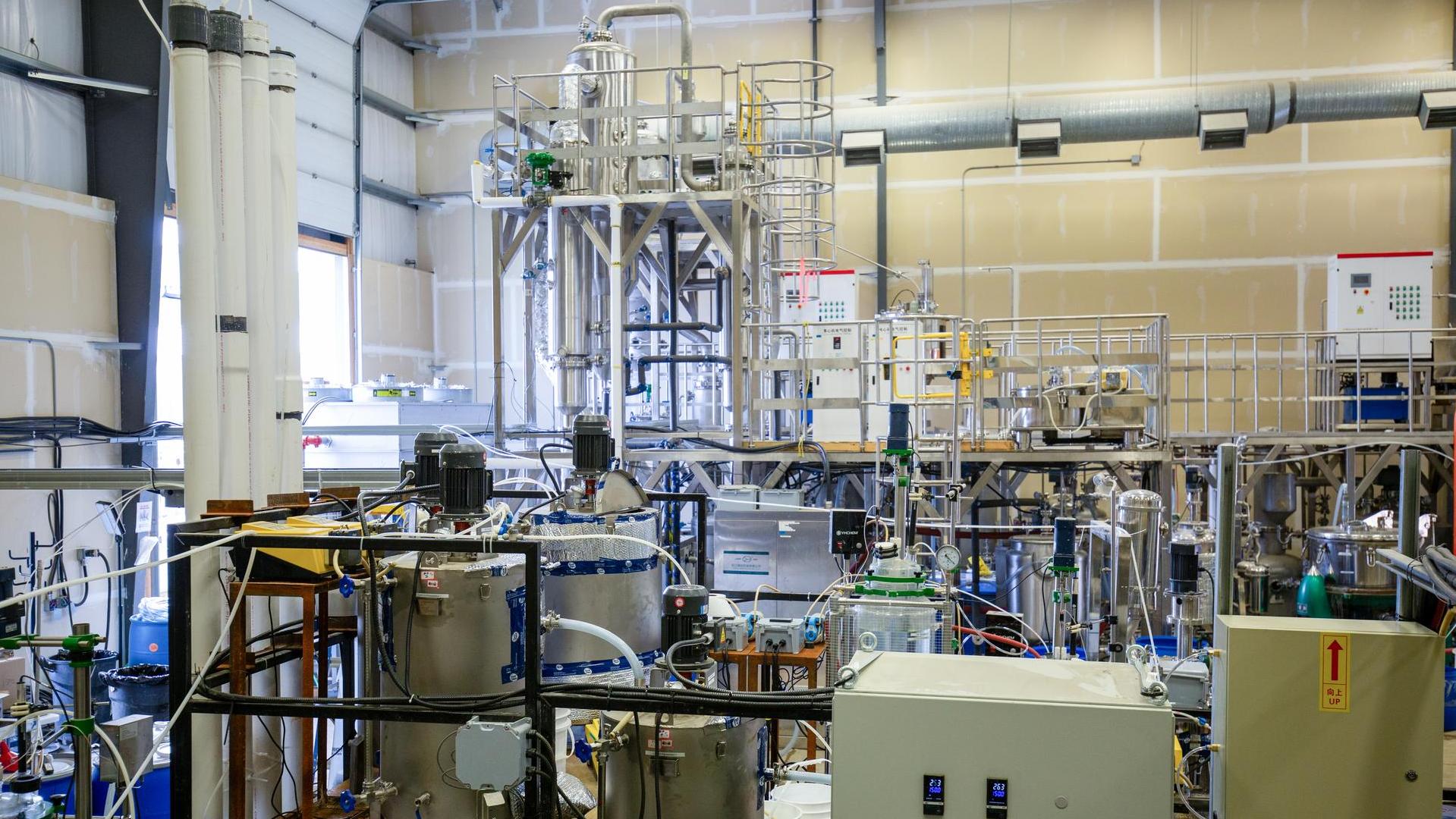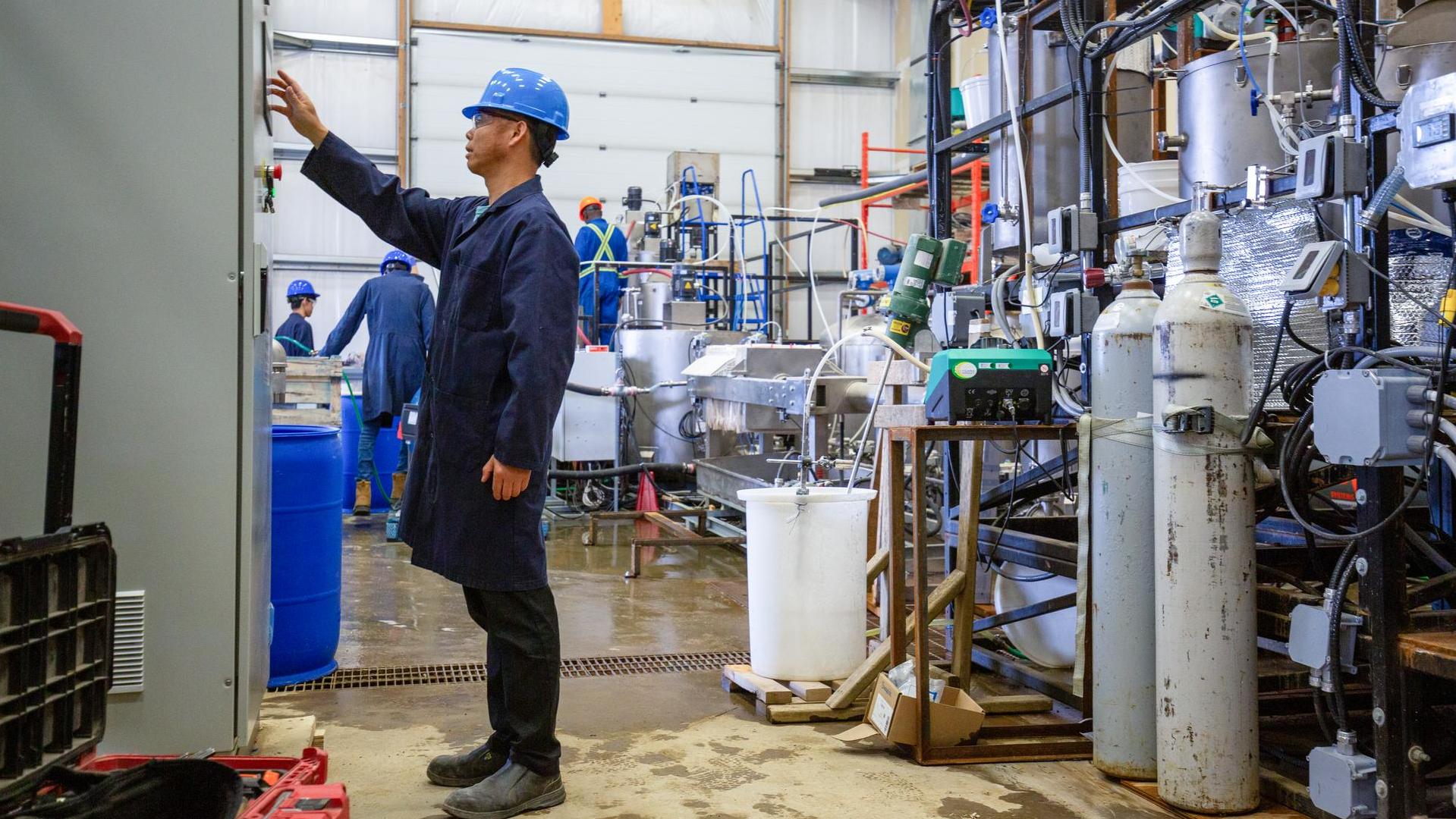The number of batteries used in energy storage is rising as the world adopts more advanced technologies, particularly green energy and electric vehicles (EVs), increasing the demand for critical minerals such as lithium.
Lithium extraction, like many resources, can be a complicated and expensive proposition for mining companies. Typically found in low concentrations, lithium deposits vary from rock to clays to brines with unique impurities from location to location. Lithium supply chains also require high degrees of purity.
“As companies look to optimize processes and plan ahead to ensure the marketability of lithium,” says Mike Crabtree, President and CEO of the Saskatchewan Research Council (SRC), “our experts can provide industry with essential expertise in every stage of testing and proving out technology and processes.”
With more than seven decades of experience in mining, SRC offers clients analytical testing, minerals process development, tailings management and everything in between.
Lithium demand requires innovation

Today, about 80 per cent of worldwide demand for lithium goes to rechargeable battery manufacturing for EVs, electronics and electric grid storage.
Although lithium has been used in glass products, medicine and lubricating greases for years, the need for batteries is driving demand for higher purity lithium than most of the market previously required.
“Lithium hydroxide for batteries needs 99.5 per cent or greater lithium purity and more than anything, companies need to ensure that certain impurities do not exist or exist at very low concentrations,” says SRC’s Chief Operating Officer, Ryan Hill. Higher purity requires more complex testing and design strategies, leading to exponentially higher costs.
Despite a large market need for high purity lithium, fluctuating prices have made process optimization one of the essential ways to ensure the profitability of lithium projects. This is where SRC’s specialized expertise in both technology development and pilot testing helps companies efficiently develop a viable process.
“Ensuring that companies have fully optimized their processes, that they've proven out the purity and the recovery, that’s how they can really drive down the cost per tonne while ensuring or improving product quality,” says Hill.
Addressing the challenges that market dynamics bring through rigorous and specialized testing, validation and development is what SRC does best. As the second largest organization of its kind in Canada, the depth and breadth of its expertise means SRC is well equipped to help lithium companies develop cost-effective processes that are not only innovative but are designed and tested for real-world situations.
Lithium technology solutions
“SRC looks to catalyze industry in unique ways that are specific for each those industries,” says Lucinda Wood, manager of SRC’s Business Development team. “We address these challenges differently depending on what the industry or our client needs.”
While SRC offers the mining industry a wide range of services for other critical minerals, such as rare earth elements, uranium and potash, what sets it apart in lithium is how its experts have tackled some of the more complex problems faced by industry in lithium extraction, from hard rock processing to traditional and novel brine extraction and lithium-ion battery recycling.
“Where we really standout is when clients come to us with a process or technology that has challenges to implement or commercialize,” says Wood. Because SRC has a variety of technical expertise, from minerals processing to advanced manufacturing, these challenges can be addressed by a multi-disciplinary team.
“Throughout SRC, but particularly in our Mineral Processing group, we can see not only where optimization is required, but where the bottleneck problems in the industry exist and tailor our solutions to meet these,” says Wood.
Proving out by scaling up
SRC’s unique service offerings in lithium include a facility where continuous-operation pilot plants are run, with capabilities ranging from ore beneficiation and calcination to hydrometallurgical refining. This is one of the only facilities of this type in North America and Europe.
Unlike other smaller scale pilot plants in the lithium industry, SRC’s pilot plants are built so that processing runs are continuous and can be finely tuned for the final design of an industrial plant, which results in more accurate performance data.
As with many SRC projects, the lithium pilot plants were developed to meet client requests for testing, from rocks to final battery-grade products.
“At SRC, we have run pilots for decades and since we are acknowledged by industry as experts within this space, we were approached by clients to build a hydrometallurgy refining pilot facility to test out their processes,” says Hill. The first test run in the facility demonstrated the ability to produce 99.9 per cent pure lithium hydroxide from the client’s feedstock.
The hydrometallurgical refining pilot plant, as well as the lithium beneficiation plant, can process spodumene, petalite and lepidolite to produce battery-grade final products.
Jack Zhang, SRC’s Associate Vice President of Strategic Technologies, says, “The hydrometallurgical refining pilot plant is built to be re-configurable and customizable to respond to the unique challenges associated with different lithium deposits around the world.”
After the facility ran the initial tests, it was partially dismantled and rebuilt to accommodate automation upgrades and technique optimizations, then operated for a two-month run of continuous operation.
“These plants not only prove out technology and expertise within SRC, but also create a space for companies to ensure that product recoveries and qualities are marketable,” says Hill. This is essential to companies exploring new sources for lithium.
Proving out technology for lithium from brine extraction

Along with lithium mineral deposits, brines (continental, geothermal and produced waters) are also an important source for the valuable metal, but conventional extraction methods are slow and expensive.
They depend on large-scale evaporation ponds to concentrate the lithium and lengthy separation processes to remove all the impurities.
Direct Lithium Extraction (DLE) technology would flip the lithium recovery model and extract lithium from brines directly. While there are various companies that have developed and piloted a DLE technology, there isn’t a commercially available technology at scale that is economically producing lithium.
“There are many reasons why a technology like DLE is not commercially available yet, such as the cost of ensuring the process conditions are optimal for its operation,” says Wood. “Innovation for us is often attained in addressing implementation challenges using known technologies in new ways.”
Hill explains that DLE is still at a relatively early stage. “We’ve been working on a DLE technology that we believe alleviates a lot of the issues with successful commercialization,” he says. “We’ve been getting significantly more cycles out of this technology than what we’ve seen within the industry.”
SRC is also testing the process with different industrial brines to ensure the positive early results it has seen are robust enough for a variety of conditions.
Developing new sources through recycling
“It's expected by the mid-2030s that 30 per cent of the world's lithium is going to come from recycling,” says Hill. Although recycling plays an important role in the future for lithium, current recycling processes are energy intensive and produce significant secondary pollutants, such as waste residues, toxic solution discharges and gaseous emissions.
Industry needs efficient, sustainable battery recycling processes, and that’s where SRC comes in.
“SRC is supporting industry through research into battery metal extraction from lithium-ion batteries,” says Zhang. “The aim is for lithium and other battery metals such as nickel, copper and manganese to be recovered at high purity through a green hydrometallurgical process using a highly selective process and reagents.”
Currently working at the bench scale, SRC experts have developed a recycling process to extract essential metals from batteries, harnessing knowledge developed in hard-rock lithium extraction.
“The same individuals that have been involved in lithium extraction and processing from hard rock and rare earth elements have developed a process that significantly improves the recovery of lithium at a lower cost,” says Hill.
While the lithium industry faces numerous challenges, some more complex than others, SRC has the facilities, specialized expertise and experience to help companies meet the world’s growing demand for this critical mineral, through developing, testing and commercializing technologies and optimizing processes.
